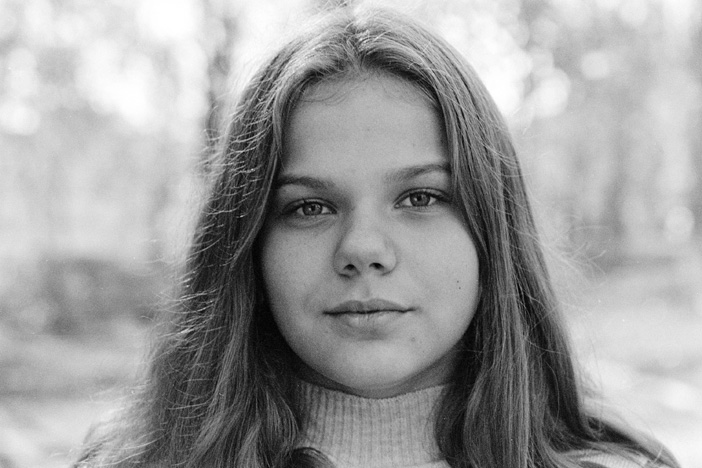
Albina, 12 years old, lives in Mykolaivka
»Yellow Bus came to Mykolaivka for the first time in 2014. In the neighboring class there was a conversation about the war and the reconstruction of the school. And then I met Yellow Bus here in 2014. It was pleasant to listen to the people of Yellow Bus and it was interesting that they helped us and that somebody visits us after the war took place here. At that time, we also learned what protection options there are, for example how to deal with duds and cartridges.<< >>
I get my information from the internet - today most of the young people are interested in the internet or social networks. At the same time I also read books and I learn news from the books, for example we are reading books for the school during the summer holidays.
I did not move away, when the war happened in Mykolaivka. We stayed in the basement. It was a very difficult time when there were shootings for three days and a neighboring house was hit by a bomb and five floors of the building collapsed. That was terrible and what happened occupies oneself for a long time. So, the war affected me personally and I still have the memories of war in my head.
I think that one can not understand war only through words, you have to experience it yourself. All my acquaintances, who don't come from Mykolaivka and who say that everything is not so bad, those people I try to ignore and I close my eyes in front of them. I try not to pay much attention to their comments. Actually, I also keep silent about what has happened, but if they are looking for a conversation with me, then I say that they would think and talk differently if they had gone through it by themselves.
It was very difficult for me at the time, I was only six years old. We were in Kyiv recently and there we showed students our short films about the war and the students were very moved by the films and some of them cried when they saw the movies. I think that people in Ukraine have compassion with us, but people abroad hardly understand what happened here.
My favorite in media are photography and video. And I'm also writing, for example I write my own articles for the press. I like to write because I'm interested in the opinion of others, for example when I conduct interviews. In the end I write an article based on the interviews and I'm glad to read my article.
Half of my friends are living in the occupied territories and I also have acquaintances through my travels to the occupied territories. I try not to talk to them about the war, because if I tried, they become very sad and ask me not to talk about it. I talked to a friend about the war and he said that it is so terrible that you don't even want to wish it on your enemy.
When we had to stay in the basement for three days because of the shootings, we did not go out at all. Sometimes we just briefly went up into our house. We had already prepared our clothes so that we could quickly take them down to the cellar if something happened. Sometimes we ran barefoot into the cellar because we did not have the time to put on our shoes. It all happened so fast and my dad carried me to the basement on his arms. After three days in the basement we had to spend two weeks in a garden pavilion and there we tried to distract ourselves with discussions and to forget what we experienced. We also ate at the pavilion back then. When there was electricity again and we had access to information, my parents immediately ran to the TV to watch the news. They wanted to know what happened and that's how the war in Mykolaivka ended for me.
Once our class teacher addressed the issue of war and the changes and a student became very sad, she left the class and started to cry. I asked her then, what had happened to her and she said that she doesn't want to hear any war topics any longer and that has also affected me. Then we talked and tried to calm down, we were saying that now the war is over for us.
Now, I try to forget the war. It's terrible to still see the war in the news and I could not imagine anything like this is happening. I try to distract myself and tell me that hopefully it will not happen again.
Today, we also try to talk about the war and to report exactly what has happened to us in places, where people did not experience the war. And in this context, we also show our short films about the war and the people are interested in it.
We created short films with different contents too, for example about ecology or environmental issues in our city.«